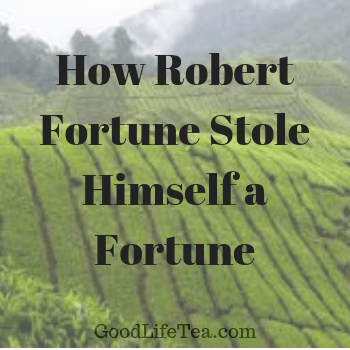
Hello, my lovely tea friends! In pondering on what to write about this week, I was presented with an article on a book that delves into more of a historical take on tea and the espionage behind it that many don't know or aren't familiar with. This book, "For All The Tea In China", written by Sarah Rose, proves extremely intriguing and especially thought provoking as it covers the ever hidden tale of how England (in truth, a Scotsman) actually stole the tea secrets and therefore industry from China.

As you guys know, formerly being a complete tea novice myself, I did associate tea with the English a lot of times. After reading this book, I find myself embarrassed of such a thing and with a new respect for the Chinese. The book, itself, is a historical recollection of how Scotsman, Robert Fortune, was able to disguise himself as an Chinese man and tea grower, and assimilate himself into the culture where he learned the detailed workings, processes, and highly protected secrets of the tea trade. He did so by creating a counterfeit identity. He shaved his head aside from just a braid and camouflaged in a silk robe. He negated the fact that his physical stature and facial features segregated him from his contemporaries. He maintained the position of being a tea harvester himself which was only aided by his extensive background in botany and his past experiences of being a seasoned horticulturist.

When making these trips to China, Fortune, would indulge in these spy missions, if you will, and immerse himself with the commoners of the tea regions of China. During these trips, while still maintaining his alter ego, he would befriend those of thorough knowledge of tea growth and maintenance and therefore retain their secrets to carry back to Western civilization. While to a businessman this may appear to be an apprenticeship or entrepreneurial, in reality, what Fortune accomplished was the burglary of an industry.

Upon his first venture he was not able to bring seeds successfully back to East India. This he quickly remedied and was prosperous when he ventured back with seed terrariums. What Robert Fortune essentially achieved was the monopolization of the industry as he now knew and was familiar with all the tricks and trades of the system. He plundered the Chinese establishment through deceit and fooling. I find it especially humorous that his last name be Fortune when he had stolen a fortune of his own.

While this is simply only a very rough and shortened version of the story as a whole, I highly recommend this book. Sarah Rose does a phenomenal job of allowing for true historical tellings to be woven into an enjoyable story and tale of pilferage. It becomes even more impressive when you go on to read how Robert Fortune's journals of his travels and findings were later burned by his wife in an attempt to protect his reputation. Rose must have searched high, low, near, and far for her findings. Myself, I find it shocking that this part of history has not been made into a highly well acclaimed movie. I certainly hope that it will and I can guarantee that I will be at opening night of the box office to catch it!
If you do get the chance to read this wonderful book, or at least look into the history of all of this, please leave comments! Let me know your thoughts or different similarities you see to common day happenings! I wish you all a wonderful fall day!
Best -- Kay-tea :)
